#Still Unsolved
Explore tagged Tumblr posts
Text
Has Amelia Earhart’s Plane Really Been Found? 6 Key Things To Know
A New Grainy Sonar Image Claims to Solve the Mystery of the Famed Aviator’s Disappearance, But Experts Say it’s Too Soon to tell. Here's What We Do Know.
— By Rachel Hartigan | January 29, 2024
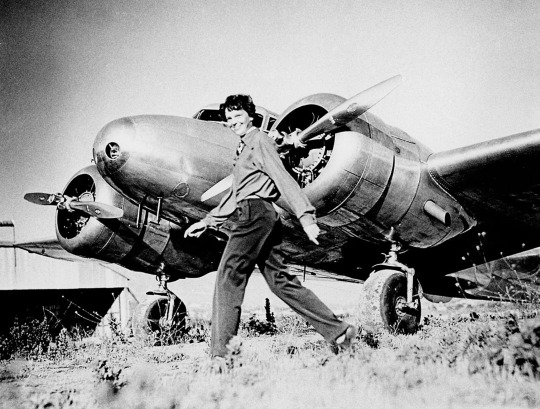
Amelia Earhart and navigator Fred Noonan disappeared over the Pacific Ocean in an attempt to circumnavigate the globe in this Lockheed Electra 10e airplane on July 2, 1937. Experts say it's too early to know for sure whether claims that the wreckage has been found are true. Photograph Courtesy PF-(Aircraft), Alamy Stock Photo
With the Release of a Grainy Gold Image, news headlines around the world are trumpeting the possible discovery of Amelia Earhart’s Lockheed Electra 10e, the plane she was flying in 1937 when she and her navigator, Fred Noonan, disappeared during the most difficult leg of their round-the-world flight.
Deep Sea Vision, a new venture founded by pilot and commercial real estate investor Tony Romeo, captured the sonar image during a hundred-day expedition in the central Pacific, the region where Earhart was lost. “It was definitely a surreal moment for all of us,” says Romeo, who sold his real estate holdings to purchase a cutting-edge autonomous underwater vehicle (AUV) equipped with highly advanced sonar technologies.

The remotely operated vehicle Hercules is retrieved from the waters off Nikumaroro Island onto the deck of the E/V Nautilus in 2019 after a day of searching for Amelia Earhart’s missing airplane. Explorers have long sought to solve the mystery of the famed aviator's fate. Photograph By Gabriel Scarlett, National Geographic Image Collection
Still, it’s too soon to say whether this discovery of an object 16,000 feet deep means one of the great historical mysteries has been solved. Here’s what we do know.
1. Sonar Images Have Limitations.
Sonar images are not photographs. The sound waves sent by sonar are at a low frequency, which translates to low resolution.
“The sound wave, because it’s so big, can’t see fine detail,” says David Jourdan, an engineer whose company Nauticos has led three expeditions in search of Earhart. “It can be distorted by reflections, like taking a picture of a mirror.” Promising images, on a second look, sometimes turn out to be something else entirely, like a geological formation.
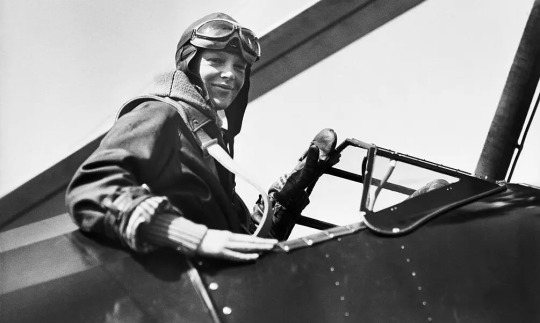
Amelia Earhart is shown in the cockpit of her autogiro on April 8, 1931, after setting a new altitude record for women in planes of this type. Bettmann/Contributor/Getty Images
2. Deep Sea Vision Didn’t Confirm The Object’s Identity.
Romeo and his team found the image in their data storage files as they were transitioning to another expedition. They thought that data from one of the AUV’s earlier sorties had been corrupted. When they discovered it wasn’t—and that they had a potential blockbuster find—it was too late to return to the site.
“We were out of time. We were out of resources,” says Romeo. “And we didn’t have a camera on our [AUV]. It broke really early in the expedition.” Returning to go over the target again with just sonar didn’t seem worth the hundreds of thousands of dollars he estimated it would cost. Deep Sea Vision plans to go back to the sonar image site this year, this time with an operational camera on the AUV to confirm the finding.

National Geographic Explorer at Large Bob Ballard, pictured here in the control room of the E/V Nautilus, led a major expedition in 2019 to find the remains of Amelia Earhart's airplane. Photograph By Gabriel Scarlett, National Geographic Image Collection
3. Some Experts Say The Plane, If It Is A Plane, Doesn’t Resemble The Electra.
“The proportions aren’t quite right,” says Jourdan, pointing to the way the wings are swept back rather than straight across, as the Electra’s were.
Others are even more skeptical. “For the wings of an Electra to fold rearward as shown in the sonar image, the entire center section would have to fail at the wing/fuselage junctions,” according to an email blast from The International Group for Historic Aircraft Recovery (TIGHAR), an organization that has put forward the theory that Earhart died a castaway on an island to the east of the sonar image site. “That’s just not possible.”
Romeo dismisses this criticism. Both the wings and the tail look swept back due to distortion caused by the AUV moving through the water, he says, pointing to the twin fins on the back of the plane instead. “That’s very distinctive of her aircraft,” he says. “There’s only a couple of planes that’ve ever been made like that.”

Amelia Earhart is photographed with her Lockheed Model 10-E Electra, the aircraft she used in her attempted flight around the world. Earhart and the plane went missing on July 2, 1937. Underwood & Underwood/Alamy Stock Photo
4. The Object’s Location Is Roughly On Earhart’s Flight Path—But Beyond The Range Suggested By Her Radio Signals.
Earhart and Noonan disappeared on July 2, 1937, flying from Lae, New Guinea, to Howland Island, a one-and-a-half-mile long island some 2,500 miles away. After flying 20 hours, Earhart thought they were close and radioed the Itasca, the Coast Guard ship awaiting them at Howland, “We must be on you but cannot see you.” Her voice was so loud, the Coast Guard radiomen thought she was very near too. She wasn’t, but the strength of the radio signals suggest that she was just beyond visual range.
Deep Sea Vision’s search area was roughly a hundred miles west; Romeo won’t reveal exactly where to avoid someone else making the crucial find. But he does acknowledge that they were guided by a theory that Noonan had failed to account for how the International Date Line would affect his calculations. That theory, however, doesn’t account for the strength of Earhart’s radio signals.

A deep-sea exploration company has captured a sonar image of an anomaly on the ocean floor that resembles an aircraft. The team believes the object could be Amelia Earhart's Lockheed 10-E Electra that went missing nearly 87 years ago. Deep Sea Vision/PR Newswire

Tony Romeo holds a model of Amelia Earhart's plane, which resembles sonar images he and his crew captured with high-tech equipment. Tony Romeo/CEO Deep Sea Vision
5. Others Have Claimed To Solve This Mystery.
Over the nearly 90 years since Earhart and Noonan vanished, many people have claimed to have proof of what happened to them.

Members of the Ballard-led expedition dive in the primary search area just off Nikumaroro Island, an isolated ring of coral and sand surrounding a turquoise lagoon where some suspect Earhart may have been landed. Photograph By Gabriel Scarlett, National Geographic Image Collection
People who believe the Japanese captured and killed the aviators have pointed to everything from a generator retrieved in a Saipan harbor in 1960 to a photograph on a Jaluit dock revealed in 2017. TIGHAR, meanwhile, has claimed various smoking guns over the years but now argues that a preponderance of historical and archaeological evidence puts Earhart on Nikumaroro Island, 400 hundred miles south of Howland, where they believe she starved to death.
Then there’s the simplest explanation: that the aviators simply crashed into the ocean. Elgen Long, an airline pilot who with his wife Marie did the most extensive research into where that might have happened, wrote a book called Amelia Earhart: The Mystery Solved. Over three expeditions, Jourdan has looked where Long suggested (and elsewhere) and come up empty.

6. The Mystery Is Still Unsolved. That Doesn’t Mean Its Unsolvable.
Jourdan’s team believes they’ve narrowed down where the Electra went down based on recent radio signal testing. Meanwhile, when Deep Sea Vision returns to the site this year, they will bring a documentary crew to capture the moment. “This is definitely something that we need to go back and look at,” says Romeo. “We’ve got to get out there before … you know, there is some urgency.”
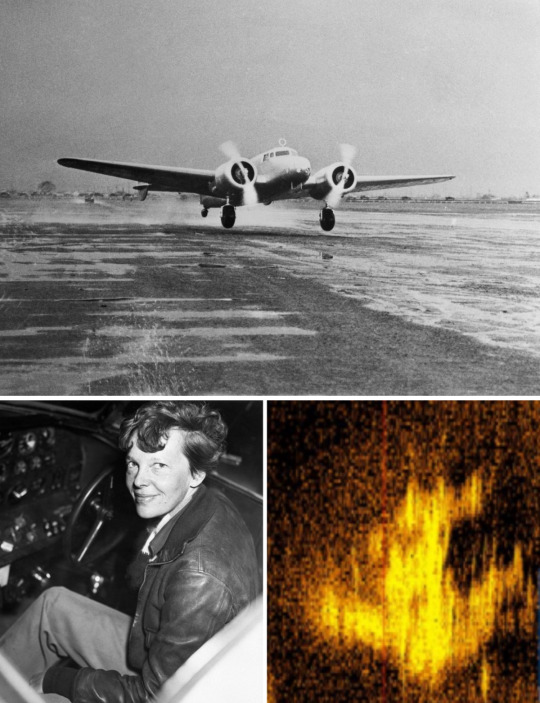
Top: The Romeo Brothers are planning another Pacific Ocean expedition to get better sonar images to confirm whether they have discovered the ruins of Earhart's doomed voyage. Bettmann Archive
Bottom: Deep Sea Vision believes they may have come across Amelia Earhart's wrecked plane in the Pacific Ocean. Photo: Bettman via Getty Images/Deep Sea Vision
Tony Romeo holds a model of Amelia Earhart's plane, which resembles sonar images he and his crew captured with high-tech equipment. (Tony Romeo/CEO Deep Sea Vision)
#History & Culture#Amelia Earhart#National Geographic#Rachel Hartigan#Sonar#Sonar Images#Deep Sea#The Electra#Radio Signals#Object’s Location#Mystery#Still Unsolved
0 notes
Text
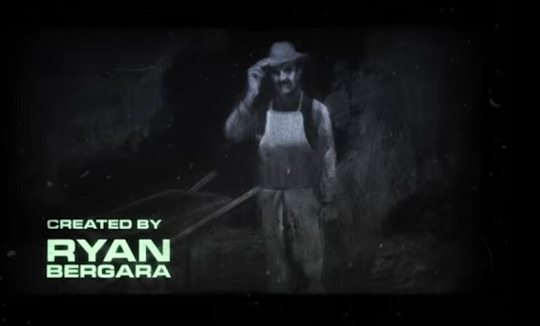
Man it is so good to see this - to see Ryan getting proper credit for his own show that he created. That man's brain is amazing and I hope he knows how much we appreciate him.
#watcher#ghost files#ryan bergara#still hate how buzzfeed treated him#and look i love unsolved#but ghost files is just such an improvement#love to see all the people working at it credited#warms the heart
4K notes
·
View notes
Text
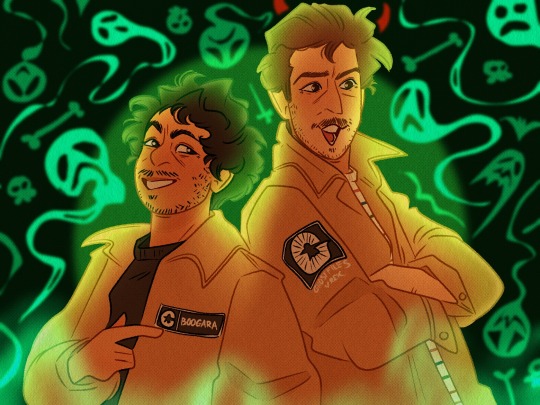
they’re gonna file your ghosts!!!
#ghost files#watcher#shane and ryan#shane madej#watcher entertainment#ryan bergara#ghost files fanart#art#digital art#illustration#youtube#csp#clip studio paint#artists on tumblr#it's always so fun to draw the boys#it's been a bit!#i started listening to watcher while drawing and was like oh okay#i still watch so much buzzfeed unsolved#iconic
822 notes
·
View notes
Text
I find it weird that people are treating the Watcher situation like a scandal when it was just bad business decision
Don’t get me wrong an INSANELY bad business decision but why would you compare it to the Try Guys situation? Like some people were acting like Shane Madej and Ryan Bergara themselves evicted them and took their dog
#watcher#I still think the Ghost Files and Mystery Files format isn’t as good as Buzzfeed Unsolved#also I saw some people pitting watcher and dropout against each other#very weird to make your own drama for two companies that have never interacted
312 notes
·
View notes
Text
Since the identity of the Sweet Sixteen Killer is known in Timeline 2, I don't think it would be as big of a part of the town's identity as it in Timeline 1. So I propose that the big unsolved mystery the town builds itself around in Timeline 2 isn't the killings.
It's Jamie.
The supposed exchange student who was only in town for five days, who knew things she shouldn't (couldn't) have, who disappeared without a trace and, when looked into, never even existed to begin with.
#I mean I guess they could still focus on the killer. let me have this#literally vibrating I have sooo many thoughts about Timeline 2#GOD I love time travel stuff#I hope you guys are prepared for me to be super annoying about this movie#Jamie tag#horror tag#hc tag#totally killer#jamie hughes#man kinda want to write one of those fics that's in the style of a Buzzfeed Unsolved episode
530 notes
·
View notes
Text
I absolutely love Unsolved (Watcher's Version)
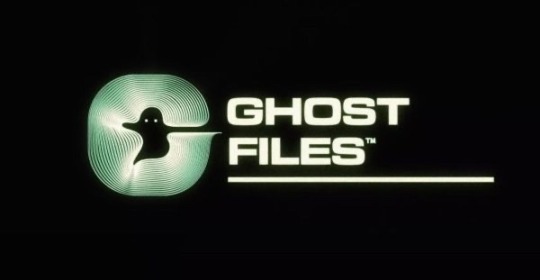
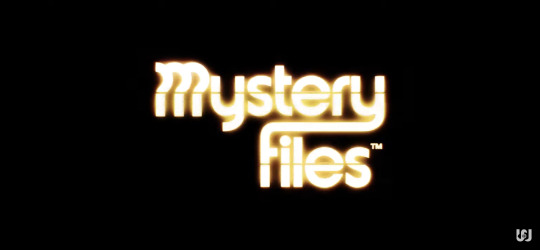
#watcher#ghost files#mystery files#mystery files sounds like it's not true crime stuff but I'm still counting it was 'unsolved watcher's version'#*as#1000#(yes like Taylor's Version- op is a swiftie)
1K notes
·
View notes
Text
You guys remember when Dan Olson's "The Line Goes Up" video dropped and was so damning and incriminating that, overnight, hundreds of the most beloved content creators and Youtubers quietly dropped any and all mention/support of crypto in their videos?
#remember when jerma was sponsored by coinbase#remember when buzzfeed unsolved ryan and shane would make to the moooooon jokes#this isn't me making broad statements about these people that i don't know and often still enjoy and respect#i'm just watching the vid essay again rn and remembered#oh yeah being into crypto was extremely cool and normal for youtubers#until this single bombshell of a vid essay dropped and utterly embarrassed all of them.#personal#delete later
346 notes
·
View notes
Text

Something's coming... 👀
The Hunter's Elegy. Deadname ghosts and name necromancy in a dystopian future. A private detective novel full of cover-ups, cults, and penance. #acab
Starring discredited cold case documentary maker Reese Keyes and his justifiably egotistical new boss, private investigator Hunt Cheroneau, who's having him record their every arrogant word while the two of them solve a case that cuts far far deeper than either of them are prepared for.
-
The extremely visceral cover art there is by the very talented @morggo. Go check out their work! It's sick as hell!
#the hunter's elegy#reese keyes#hunt cheroneau#need to practice writing summaries of this one until I stumble on the perfect one-sentence hook#upcoming#early 2025 I think?#this is the first in a series of standalone novels though I'm still working on a name for that series#The Unsolved Atrocities is a candidate#... should I be doing like. kickstarters and preorders for this stuff? I have no idea how books work
89 notes
·
View notes
Text


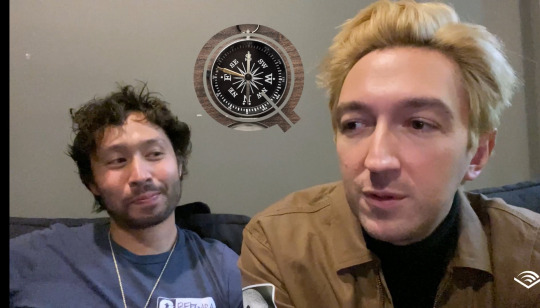
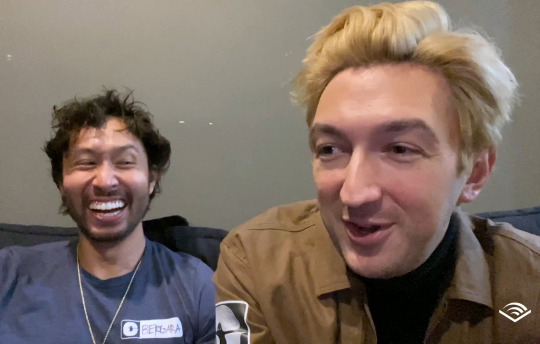
the silliest guys talking about their book that they wrote and narrated together <3 cuties!
#watcher#watcher entertainment#we are watcher#shane madej#ryan bergara#shane and ryan#besties fr#buzzfeed unsolved#they are co-authors guys!#i know this is really old news ofc but I’m still thinking about it YEARS LATER#don’t judge me!
244 notes
·
View notes
Text
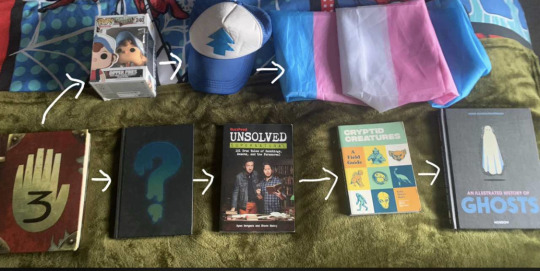
i was a victim of the gravity falls to transgenderism/buzzfeed unsolved (+watcher) pipeline and i made a visual representation for it.
#i watched gravity falls when i was nine and came out two years later#LMFAO#i kinned dipper pines too hard guys#to explain it goes:#gravity falls#dipper pines#transgender#ftm#and then it also goes#gravity falls to#buzzfeed unsolved#to a massive special interest in#cryptozoology#and then#ghosts#and#paranormal#dyu see how smart that was guys.. i tagged all the involved topics via explaining the post#cheeky sneaky that was#man i shoulda realised i was trans i cosplayed as dipper pines (tucked my long hair into the hat as well) when i was 10 for world book day#fucks sake#also a special thanks to tree fu tom. danny phantom and horrid henry#for turning me male#is this a coming out post i dont think ive mentioned im trans before#i’m trans!#diversity win! the guy yu see making trobed fanart sometimes is transgender!#im also autistic fun fact#ignore my spider-man bedding#i still pull bitches regardless of it
192 notes
·
View notes
Text
I watched the documentary on the JonBenet Ramsey case on Netflix and 2 things were clarified for me: 1. Journalistic integrity in the media has been on a downward spiral for decades. And 2. Too big a portion of law enforcement cannot be trusted to do their job and do it well.
#I’ve too many thoughts about this case#and in this age of modern forensics how is it still an unsolved case?#jonbenet ramsey#netflix
37 notes
·
View notes
Text

Akko didn't steal any cabbages, all she had to do was ask~
#diakko#little witch academia#lwa#comic#art#snowman#cabbage#I miss them#how to draw Diana's hair? still an unsolved mystery
240 notes
·
View notes
Text
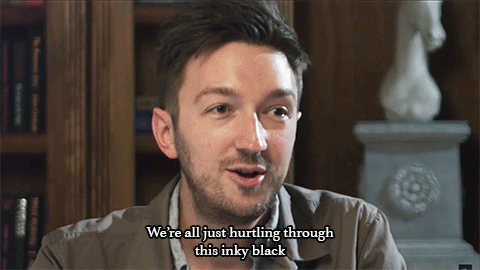
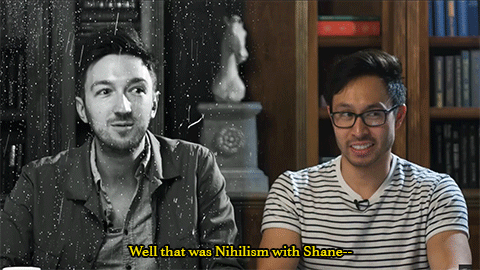
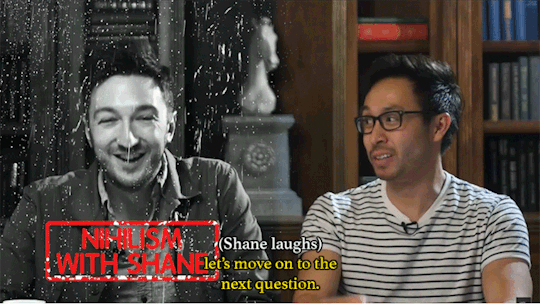
Shark Arm Murders - Q+A
#gifs give me too much power.....#still having troubles with the gif sizes sometimes#(even though i double-check to make sure ive sized the video clip down)#but thats a workable problem#going back to the unsolved days cause im sad i joined the fandom so late and missed all the early shenanigans#buzzfeed unsolved#unsolved#unsolved true crime#watcher entertainment#ryan bergara#shane madej#shane and ryan#ryan and shane#ghoul boys#gifs#gif set#gif warning#the geek gifs
83 notes
·
View notes
Text


Oh my GOSH YIKES
NOT LIZZIE BORDEN AAAAAAHH 😨😨😨
I was waiting to hear anyone else say something about this but I haven't seen anything yet and then here is the Epilogue and It looks an awful lot like he is writing the NAME again AH 😩😩😩
#identity v#idv#her story has given me the heebiejeebies since I first heard it as a kid UHG plz noooooooooooo#she is like technically alive during the alleged time period these manor games are going on sooooooo uhhhhhhhhhhhhh 1860s-1920s#that would be so weird i dunno about this lol#i mean there is jack the ripper too but he is anonymous and unsolved and here is Borden like uuuhhhhggggg#i mean her involvement is unsolved too but like -side eyes- that is some big 'sure jane' vibes. she had to have been involved in some way#helped plan the dang thing or something#but who knows maybe she was innocent 🙃#i did think it was odd that they were like 'weird nursery rhyme' bruhhh she is like literally still alive rn with yall what do you mean
42 notes
·
View notes
Text
ok i don't know if anyone noticed this but buzzfeed unsolved has been posting compilations of unsolved true crime and supernatural episodes and passing them off as NEW content with ryan and shane being back on the channel???

like this is insane to me???? it does not matter whether you like ryan and shane/watcher tv, this is disgusting behaviour - BU is literally utilising their likeness to drive views and revenue to a channel they are no longer associated with.
(and maybe using AI to do it? too blurry to tell but that sure looks like AI slop to me)

absolutely abysmal behaviour from buzzfeed, which means i expected nothing less from that soul sucking company. i doubt that ryan and shane would fight this if they even could bc that'd be a lot of money and effort for little result but good god. there really are no lows too low for buzzfeed.
#buzzfeed unsolved#watchertv#watcher#watcher entertainment#watcher tv#ryan bergara#shane madej#i only saw this bc i saw the channel was LIVE (looks like i still follow it ig) and i couldn't believe my eyes#buzzfeed
22 notes
·
View notes
Text
gotta be honest, in my very limited interactions with bfu/watcher fans, they have gotta be one of the kindest fanbases out there. i've made like two posts and they've gotten so many notes (for me, at least) and everyone is so sweet about it in general. ily guys
#puppy barks#watcher#buzzfeed unsolved#shane madej#ryan bergara#ghoul boys#still doing my rewatch of bfu btw
346 notes
·
View notes